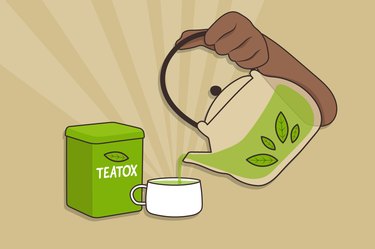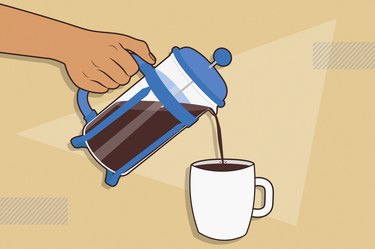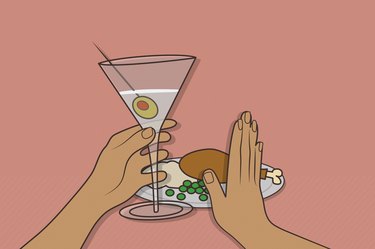
Drinking tea has many amazing health benefits, but a tea detox (aka "teatox") — an herbal tea blend that claims to help you lose weight, fight bloat and improve immunity — is a different story.
On the surface, they may seem harmless. But like other health fads, teatoxes are perpetuating the false narrative that your body could do a better job of detoxing.
Video of the Day
Video of the Day
"Your body is smart — if you have a functioning gut, liver and kidneys, you are always detoxing," Meredith Rofheart, RD, a dietitian at Culina Health, tells LIVESTRONG.com.
"Your body is always getting rid of harmful compounds, so relying on a tea that is pumped full of ingredients that could negatively affect your body is a waste of time and money."
Warning
There are health risks to doing a teatox. Because there is no regulation and insignificant data, teatoxing is not the most effective resource for neither improved mood and energy, nor for weight loss," says Brittany Dunn, RDN, CD, a sports dietitian and performance chef.
A teatox is an herbal tea blend that usually has ingredients like yerba mate, hibiscus, senna, oolong, dandelion leaf and ginseng. Most teatoxes promise weight loss, but some also claim to help with improving cognitive function, sleep and energy because they are made with adaptogens and nootropics.
"The reality is that additives in teatoxes are not at all regulated. There is no guaranteed way of knowing what is in them and little evidence of efficacy to support claims," Dunn says.
Although some blends might have harmless mixes of tea leaves, many include diuretics, laxatives and caffeine that can potentially damage your health. Here are some of the health risks associated with teatoxes.
They Mess With Your Gut and Electrolyte Balance
Many teatox blends are made with senna and senna leaf (like China Slim Tea) — a natural laxative that can have you running to the bathroom. As a result of the laxatives and diuretics in these teas, you can experience abdominal pain, cramps, bloating, gas, nausea and diarrhea, Rofheart says.
Over-the-counter laxatives and diuretics are normally recommended only for people who have constipation, as well as other health conditions like high blood pressure to help flush the sodium out of your body, per the Mayo Clinic.
But if you don't have these known health issues and start drinking teas that have diuretics and laxative ingredients, they can negatively affect your body's normal digestive and detoxification process.
"Teatoxes can create electrolyte imbalances, cause damage to the kidneys and possibly, long-term damage to the digestive tract because they promote loose bowel movements and excessive urination," says Amber Trejo, RDN, dietitian and founder of Naked Wellness.
While it may seem like you're losing weight because your body is removing a lot of "waste," you're actually losing water, in addition to excrements. This isn't how sustainable and effective weight loss works.
"Dehydrating yourself through excessive water loss is not a safe or effective way to lose weight, and once you properly re-hydrate after losing all that water, you will return to your original weight," Rofheart explains. Imagine what that would mean if the teatox you're following suggests drinking it twice a day for at least 30 days...
They Can Make You Extra Jittery
Guarana and yerba mate are common ingredients in teatox blends because they naturally have caffeine, which also has a mild diuretic effect.
And while caffeine has been shown to increase your metabolism slightly, it's not enough to promote significant weight loss because your metabolism drops back to its normal rate after the caffeine is metabolized, Trejo says.
"Caffeine additives used in teatoxes may have extremely high amounts of the stimulant and cause caffeine overdose. This is associated with increased risk of health issues including dizziness, insomnia, irritability, hormonal imbalances, irregular heartbeat and seizures," Dunn explains.
FYI, the FDA recommends taking in no more than 400 milligrams of caffeine a day.
They Can Interact With Medications
Laxative and diuretic ingredients can also interact with certain medications you're taking.
For example, they can interfere with the medication digoxin, which is used to help treat heart failure, wafarin (a blood thinner) and estrogen, Dunn says. "Yerba mate also interacts with several medications, including lithium (prescribed to those with mood disorders), antibiotics and some asthma drugs."
In addition, ginseng in these teas can interact with medications prescribed for depression and diabetes, as well as immunosuppressants, according to the U.S. National Library of Medicine. Because ginseng can increase bleeding, it can pose a danger to those taking blood thinners too, Trejo says.
Some people who take ginseng also report having diarrhea, insomnia, headaches, rapid heartbeat and blood pressure fluctuations, Rofheart says.
Many teatox blends also have ingredients like kava kava and valerian root, which are used to promote sleep, but Trejo says they should be avoided if you have liver disease or liver failure because they're associated with liver damage, per April 2020 research in LiverTox: Clinical and Research Information on Drug-Induced Liver Injury.
"Licorice root is another popular ingredient in these tea blends that can have a negative effect on your blood pressure and should be not taken if you're on any loop diuretics or thiazides," Trejo says.
That's why it's very important for you to speak to your doctor about any herbal teas and supplements before introducing them into your diet.
They Might Be Linked to an Increased Risk of Cancer
Although occasionally drinking yerba mate isn't likely to have any risks, some research has shown that drinking large amounts of it — particularly when it's really hot — is associated with an increased risk of cancer, according to the Mayo Clinic.
"Taking in a lot of yerba mate over a prolonged period of time has been associated with the incidence of lung, mouth, stomach, esophageal, laryngeal and bladder cancer," Rofheart says.
One possible reason is that hot yerba mate has polycyclic aromatic hydrocarbons (PAHs) — the same ones you're exposed to from eating grilled or smoked meats. PAHs are chemicals that can cause changes in DNA, which are linked to an increased risk of cancer, per the National Cancer Institute.
A December 2018 review in the Journal of Environmental Science and Health reviewed 10 articles that measured the PAHs levels in commercial dry samples of mate leaves (mate leaves are usually dried by smoking, so samples tend to have high amounts of PAHs), and found that nearly all of the samples had very high amounts of certain PAHs.
But, the review notes that PAHs are often hydrophobic, so they may not transfer in drinks. In other words, more studies are needed to determine whether you can get PAHs from drinking yerba mate. To play it safe, avoid drinking large amounts of yerba mate in teatox blends — and if you drink it on its own, enjoy it occasionally and at cooler temperatures.
They Can Lead to Nutrient Deficiencies
People who are following teatoxes often forego eating enough food because they are looking to lose weight, so not only are they in a calorie deficit, but they may also have nutritional deficiencies.
"Because the laxatives in the teas can irritate the digestive tract when taken in excess, you also risk not absorbing all the nutrients from your food because the transit time is sped up," Trejo says.
"Calorie- and nutrient-wise, it's not where you want to be if you're an athlete. It's not going to help with performance because you're not taking in enough protein and carbs to repair muscles and replenish energy. So you have to ask yourself, even if it helps you lose weight, what does that mean for your body composition if you're losing muscle?" Dunn says.
Teatoxes can also lead to disordered eating patterns because they encourage you to ignore your hunger and fullness cues. "This may happen because once someone stops drinking these teas and gains the weight back, they will start thinking the teatox is what works for weight loss, thus instilling a fear of food," Trejo says.
So, Is It Really That Bad to Try a Teatox?
It's a really bad idea. In fact, you should avoid them completely because they're likely a waste of your money, they don't have proven health benefits and they can put you at risk for a variety of health issues.
"As a weight-loss dietitian who has been helping people lose weight over the last decade, there is nothing quick or easy about weight loss, and there is nothing good about jeopardizing your health for the sake of losing a few pounds that will come back," Trejo says.
The truth is that the ingredients in these teatox blends aren't regulated, so there's no sure way of knowing what's really in them and how they can affect your body.
Focusing on exercising and following a nutritious balanced diet rich in vegetables, fruits, whole grains, lean protein, dairy and healthy fats will ultimately help you lose weight without pooping and peeing your brains out.
- U.S. Library of Medicine: "American Ginseng"
- LiverTox: Clinical and Research Information on Drug-Induced Liver Injury: "Valerian Root"
- Mayo Clinic: "A Friend Suggested That I Try Yerba Mate Tea to Boost My Energy. What Is Yerba Mate?"
- National Cancer Institute: "Chemicals in Meat Cooked at High Temperatures and Cancer Risk"
- Journal of Environmental Science and Health: "Polycyclic Aromatic Hydrocarbons as a Potential Source of Carcinogenicity of Mate"
- Food and Drug Administration: "Spilling the Beans: How Much Caffeine Is Too Much?"
Was this article helpful?
150 Characters Max
0/150
Thank you for sharing!
Thank you for your feedback!



